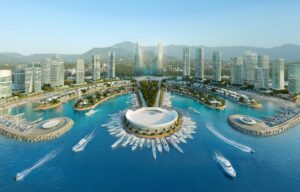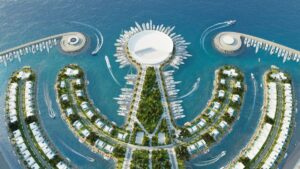The first phase of the Ambassadori Island project in the Black Sea, covering 26 hectares of the western peninsula, has been officially accepted into operation by the Construction and Technical Supervision Agency. This acceptance was based on an expert conclusion from the National Bureau of Expertise of Georgia, confirming the project’s compliance and prepared with the involvement of international specialists.
Starting in September 2025, construction will begin on two ultra-modern, multifunctional buildings on this site. These buildings will include residential apartments, hotels, indoor and outdoor swimming pools, fitness centers, recreational areas, shopping centers, and more.

Ambassadori Island Batumi is part of a unique development initiative aimed at creating two artificial peninsulas and one artificial island in the Black Sea. Covering a total area of 84 hectares, the project is aligned with long-term urban development goals and presents new investment opportunities for both Georgia and the broader region.
Since the start of construction, the project has progressed rapidly. A key milestone is that Ambassadori Island Batumi is fulfilling its commitments to the state five years ahead of schedule, with 38 out of the total 84 hectares already practically developed.
The project is being implemented by Ambassadori Group in partnership with several prestigious international firms. These include the Turkish architectural and engineering company Yüksel Proje and the global British company ARUP, which has contributed to urban planning in numerous cities around the world.
As part of its investment obligations, 49 percent of the territory across the two peninsulas and the island will be dedicated to publicly accessible recreational spaces. These will feature forest parks, walking trails, sports fields, and other public amenities. In addition, the development will include educational and healthcare institutions, hotels, apartments, villas, residential buildings, helipads, a yacht club, and more.
Created through close cooperation with both local and international partners, the artificial island will introduce a new standard of urban development along the regional coastline. This transformation, along with the physical expansion of the territory, is expected to reshape public perceptions of what future cities can be.















